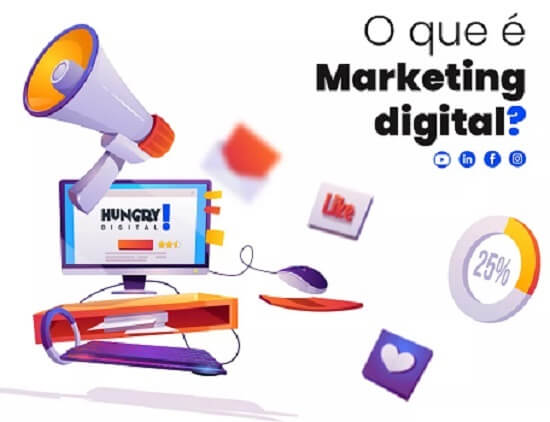Digital marketing is the practice of leveraging electronic technologies and digital media such as mobile phones, display advertising and any other digital medium to promote products and services.
Digital marketing utilizes a variety of tactics such as search engine optimization (SEO), content marketing, email campaigns, social media marketing, paid search ads, influencer marketing, and more to reach new customers. ways.
The purpose of digital marketing is to drive website traffic, increase brand awareness and generate leads for businesses.
By using digital channels to communicate with prospects on an individual level, businesses can create personalized experiences that lead to higher conversion rates.
Additionally, these tactics allow businesses to track user interactions so they can monitor their performance and measure ROI much easier than traditional offline methods.
Digital marketers also use data analysis techniques such as A/B testing or heat mapping technology in order to better understand customer behaviors, allowing them to target specific audiences more effectively with personalized messages.
popular digital channels
Digital marketing refers to the use of digital channels such as websites, search engines, social media platforms and mobile apps to promote products or services.
These channels allow businesses to connect with their target audience quickly and easily by providing relevant content.
Popular digital channels include search engine optimization (SEO), content marketing, pay-per-click advertising (PPC), and influencer marketing.
SEO is a process that helps websites rank higher in search engine results pages (SERPs).
Content marketing helps businesses create valuable content for their target audience that can be shared via various digital platforms.
PPC is an online advertising model where advertisers pay a fee each time their ads are clicked on by potential customers.
Influencer marketing involves partnering with influential people who have a large following on social media platforms to promote products or services.
All of these digital channels help businesses reach more people faster than traditional methods like print ads or television commercials.
Benefits of Digital Marketing
Digital marketing is the process of promoting products and services through digital channels such as search engines, email campaigns, websites, social media platforms and other multimedia sources.
It involves using a variety of tactics to reach potential customers and build relationships with them.
Digital marketing allows businesses to connect with customers around the world in real time.
One of the most significant benefits of digital marketing is cost savings. Traditional forms of advertising can be expensive compared to digital methods like SEO and PPC (Pay-per-click).
Businesses can save money by targeting specific audiences through their digital channels, while spending less on traditional methods like TV ads or radio spots.
Additionally, many digital marketing techniques allow for tracking and analytics that provide valuable insight into customer behavior, which helps improve ROI (Return on Investment).
Another advantage of using digital marketing is the ability to generate leads quickly.
Digital campaigns can reach potential customers faster than traditional methods because of their global reach and immediacy.
Businesses can create targeted campaigns that effectively engage consumers so they have a better chance of converting those leads into sales or subscriptions.
Finally, companies gain access to valuable customer data from analytics tools that help them better understand their target audiences in order to create more effective strategies to reach them in the future.
Digital Marketing Challenges
Despite its potential benefits, digital marketing also presents some unique challenges for businesses.
For example, many online platforms are constantly evolving, which can make it difficult to keep up with the latest trends and best practices for optimizing campaigns.
Furthermore, tracking results can be difficult due to the large amount of data available from different channels.
Also, competition on popular platforms like Google or Facebook can be intense as there are many companies vying for the attention of the same audience group.
Finally, there is always the risk of a campaign failing, which can lead to wasted resources or even reputational damage if done incorrectly.
Conclusion
The bottom line of digital marketing is that it is an effective way for businesses to reach their target audience and build relationships with them.
It can also help organizations increase their sales as well as save time and money on traditional marketing methods.
Digital marketing can be used to promote a brand, drive website traffic and generate leads for a business.
Furthermore, using analytics tools, companies can measure the success of their campaigns in order to optimize them for maximum return on investment.
Leveraging the power of digital channels such as social media, email marketing, search engine optimization (SEO) and content marketing; businesses are able to gain more exposure and reach more potential customers than ever before.
With that in mind, it's clear that digital marketing must be an integral part of any successful business strategy today.

